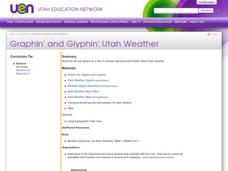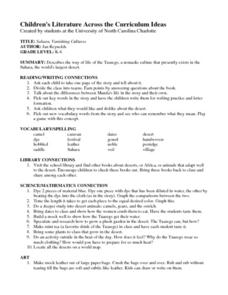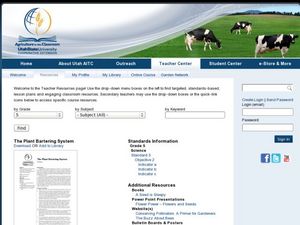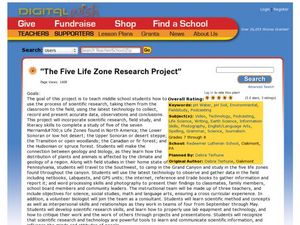Curated OER
Counting Books
Students create counting books. For this counting book lesson, students make their own book which counts on each page and has a corresponding picture. These books can count by 1's, 2's, 5's, or even fractions.
Curated OER
What Is Sustainability?
Students discuss environmental preservation and sustainability and their role in consumption and preservation. After a brief demonstration of how limited our resources are, students determine which natural resources they use most...
Curated OER
The Coyote Population: Kansas Prairies
Students discover animal lifestyles by researching their ecosystem. In this animal statistics lesson, students research the geography of Kansas and discuss the reasons why wild animals survive in the open Kansas fields. Students complete...
Curated OER
Places and Production
Learners calculate United States GDP and GDP per capita, use a choropleth map to acquire information, and create choropleth maps of GDP per capita in South America. They identify regions with high and low GDP per capita
Curated OER
Graphin' and Glyphin' Utah Weather
Fourth graders use glyphs as a way to visually represent information about Utah weather. These nonverbal representations help students collect and interpret data in a visual format.
Curated OER
Working Watermelon
You're going to wish you had a watermelon for this lesson! Class members read about watermelons and make a salad in class to sample. They also perform estimates, measurements and calculations on a watermelon. They predict what percentage...
Curated OER
Rounding to the Nearest Million
Rounding numbers to the millions can be tricky for many young mathematicians. Students work with numbers that are rounded to the nearest thousand and round them to the nearest million. There are six sets of problems altogether.
Curated OER
Places and Production
Students investigate the economy and the market value of goods. In this algebra lesson, students differentiate between domestic goods value and international good value. The define and identify the importance of GDP or Gross Domestic...
Curated OER
You Scratch my Back, I'll Scratch Yours
Students explore the concept of interdependence. In this integrated interdependence lesson, students interpret graphs and charts that require them to analyze the relationship between Mexico and the United States. Students also...
Curated OER
Combine and Separate Shapes
In this shape recognition worksheet, students use the examples in each problem to help them find the shape for each example. Kids find solid shapes for a box of cereal, Egypt shapes, a can of tuna, and a funnel. Students finish with two...
Curated OER
Children's Literature Across the Curriculum Ideas-Sahara, Vanishing Cultures
Students read Sahara, Vanishing Cultures by Jan Reynolds. They complete a variety of cross-curricular activities surrounding the study nomadic cultures. Included are reading, art, math, science, writing, social studies, and library...
Curated OER
SRDES-Webquest Project
High schoolers create a webquest on any topic that they would like. Before students begin their webquest project they visit a webquest and select the Social Studies; they then choose "Blmorhea-Oasis in the Desert." They work through the...
Curated OER
Earth: the Apple of Our Eye
Students dissect an apple to model the percentage of land on Earth that can be used as a food-producing resource. They use fractions to determine the habitable and agriculture area of the apple.
Curated OER
Graphin' And Glyphin' Utah Weather
Fourth graders investigate the concepts of looking at sets of data. The focus of the study is upon the local weather of Utah. They study the weather found in the city and in the country and make comparisons based upon geographical location.
Curated OER
The Plant Bartering System
Fifth graders explore plant characteristics by viewing a flower and seed presentation. In this environmental adaptation activity, 5th graders identify specific traits plants have in order to allow them to grow in different climates...
K5 Learning
The Merchant's Caravan
Scholars show what they know about a reading passage, The Merchant's Caravan, by way of four short answer questions designed to reinforce reading comprehension skills.
Curated OER
Pen Pals
Students collect bird count data at their sites, and share and compare the data collected from two different schoolyards using computer technology.
Curated OER
Less vs. Fewer
When should you use less, and when should you use fewer? Straighten out this dilemma with a helpful resource about using less vs. fewer based on sentence context clues. After reading detailed instructions and examples, young learners...
Curated OER
Are You a Super Sign Speler or Speller?
Why is spelling important? Develop your class' spelling skills. They examine examples of homonyms, heteronyms, and creative spelling. They also photograph misspellings in the real world in order to discover the importance of spelling...
Curated OER
Topography of Africa
Students study Africa's diverse landscape and investigate how these features impact the available water supply, food sources, and population distribution of the continent. They compare topographical features and
their affect on each...
Curated OER
Where Do We Live?
Second graders investigate various types of habitats. In this habitat exploration lesson, 2nd graders view a PowerPoint presentation on habitats and explore websites to gather more information. Students choose a habitat to focus on and...
Curated OER
The Five Life Zone Research Project
Students study five of the seven life zones in North America. In this journalism lesson students use the Scientific Method working in teams. They use lab equipment and technology to create a presentation on five of the seven life zones...
Curated OER
Change or Adaptation
Students identify the adaptive forces in the life cycle of plants, animals, and humans, isolate and identify the role that change and adaptation play in extreme environments and research and write a short term paper using MLA citations.
Curated OER
Migration Nation
Students study the concept of animal migration. They explore the migratory patterns of four different animals. Specifically, they search for on-line information about the natural history of animals and explore reasons why animals might...

























